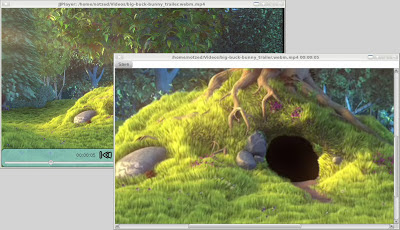It's all down-hill from here ...
I'm a couple of weeks away from being officially 'middle aged', although it doesn't really feel any different from any time in the past 5 years or so. Probably not surprising as nothing has really changed in that time. I guess mainly i'm not going out as much and not riding anywhere near as much but otherwise i'm about the same weight/fitness, same grey/hairline and have a similar set of aches and pains ...!
One thing hasn't changed in a very long time is my cynicism in general - one nick-name at work back in the late 90s was 'Grumpy' - although these days i'm less reticent about verbalising it as bluntly as I feel like at the time.
However one thing in particular I'm getting more and more disillusioned with is the state of technology in terms of software. Despite enormous advances in hardware and information and cost, we still basically have software at about the same level of shittyness as we always have. If anything, it's worse due to the sheer volume of mediocrity dragging the bell curve down. Together with particularly stupid ideas like HTML5. Whilst there are a few gems I believe the core problem is the complexity of software. It just keeps going up - which just means software is always playing catch up and never reaching maturity.
Some people seem to really get off on this constant change - like a manipulative game which doles out worthless rewards piecemeal in order to turn your learning-by-play-for-survival instincts against you - mostly worthless incremental improvements or often just 'change for change sake' which seem to get people overly excited. But we've all seen this shit before - if everything gets better ever release then it must've been pretty shit to start with, and with a certainty whatever we have now will be shit compared to the future, so why all the excitement? It might appear to be rapid progress but in reality it's just spinning the wheels.
This complexity and constant (but in reality unmoving) change is really just a competitive tool to manipulate the public. Think of the fashion industry. On the surface it is vibrant and active but in reality nothing really changes and it just goes around in cycles and it's all about marketing and extracting money.
For example over the last 15 years i've seen an awful lot of man hours go into every system, but the differences to a 15 year old desktop computer are really quite minimal outside of details and performance due to hardware improvements. What improvements there are are really despite the software side of things not because of them.
So here's a few thoughts and rants on many topics in no particular order:
- Apple mini ipad
- Big mistake. After big jobby's filing-fingers comments it had to be something special, and a low-res screen/underpowered for the time hardware is not it. This severely tarnishes the 'best of the best' premium brand Apple likes to project and is the start of relegating them back to the niche from which they came. After all the "retina" bullshit it really had to have at least that + upgraded cpu.
- Microsoft
- Lots of stupid mistakes. Phone is a complete disaster, although bringing down Nokia and QT was a good move on their part (removing a huge chunk of the competition - if it wasn't illegal it surely should be). RT is a complete disaster.
Surface PRO is a dumb idea - mostly because it competes with their own customers even if it ever does sell. Which I don't think it will - it's just an overpriced underpowered machine which can't make up it's mind what it is. A business would be better off with a netbook and the general public just wants a dumb appliance.
Unlike some weak willied saps I don't mind saying I hate Microsoft. They set the tech world back at least a decade with their junk and illegal shenanigans and they continue to interfere outside of the open market. And if you don't think that isn't a valid reason for 'hate', I think you need to re-evaluate your value system.
- Android
- I wish it was a proper GNU/Linux and I wish it was a proper Java. After some initial 'wow, neat', my thoughts have definitely cooled based on it's limitations and roadblocks. It suffers greatly from being designed for 5+ year old hardware whose assumptions no longer hold even for a $50-outright phone.
- Google is NOT the friend of free software or 'open sauce'. They are just a user and abuser of it and their customers in general. I wish more in the free software world recognised this. They only contribute when they're legally required or where it suits them commercially or for marketing purposes. Which obviously works well.
They're also a general proponent of the "fuck the user, we know best" mindset which is infiltrating all of IT. Not that I don't sympathise with this substantially, but i'm not the one trying to win over and influence people.
- ChromeOS
- Yay, thin clients all over again.
Yay, netbooks all over again.
World has been there before. Even battery powered ARM devices are getting powerful enough now they can do much more than run lightweight frontends to network services. Well they could if the frontends were lightweight and not supporting such a heavyweight framework as ...
- HTML5
- This will be one of the biggest sinks of money and man-power in tech-history. The multi-national software vendors are just using it as a weapon to keep their competitors occupied whilst they cement their own technology. It is now so complex and large it may never be possible to create an implementation of sufficient quality and interoperability. Problems which have forever plagued the net since the first clone of NCSA Mosaic was made will never be resolved. The web is becoming more closed than ever - more and more sites are 'chrome-only' or 'firefox-only', and then only with the absolutely latest versions.
- FirefoxOS
- See ChromeOS.
- SystemD(OS)
- The authors don't like Unix and want to create their own clone of Apple's operting system. Sure why not, but why do they have to fuck up a GNU/Linux system to do it? Apart from the ego trip it seems to be about proprietising their brand of Unix and stealing a customer base from what used to be a different product.
Next time I "upgrade" or install a system it will probably be slackware (if i have the choice on the hardware in question, I am hoping it is ARM based). Whilst i'm still using Fedora on a few machines they will not be installed with anything more recent than the already dated version they have.
- Java
- Oracle need to make the browser plugin free-software or face it's extinction as a platform for Java delivery - not that it isn't that far off at this point. Mostly for security reasons but also for cost and platform support.
The browser plugin has been a PR disaster, but one must also temper it with the fact that for Mozilla, Google, and Apple - Java is a direct competitor. It is in their interest to make it appear as scary as possible as well - and they're sparing no effort there.
At least the GNU/Linux support for Java is finally absolutely first class and in some cases arguably the best of all platforms. As a developer this creates great freedom - it doesn't matter which GNU/Linux distribution I use for development, or which proprietary os the customer does. For me Java is the 'platform', making the system it runs on irrelevant.
- JavaFX
- Apart from the media stuff which sucks about as much as every other media api ... ever ... it's looking great. The Android and apple versions must be released for free (in terms of cost at least) - there's no real money (of the sort Oracle could justify) to be made in development toolkits anymore and there hasn't been for a very long time.
- ARM
- Just going from strength to strength. The A15 and big/little stuff looks very exciting but I really want to see some micro itx form-factor machines with desktop-class i/o and memory and first-class GNU/Linux support. The mobile/low power i/o & memory stuff is really hampering the performance where battery power is not an issue and too many machines are just disposable android computers.
There is far too many proprietary parts to ARM SOC's though - including the CPU itself.
- Netbooks
- Apparently ASUS is dropping them. Apart from some obvious microsoft influence on the decision ... I really just think it comes down to margins for the manufacturers. A cheap product doesn't make much money and with margins so thin in the industry already it just doesn't make any sense for them. Just add a bit more hardware and call it an 'ultrabook' and sell it for a much higher margin instead ...
Presumably we'll be able to get cheep/small laptops intended for the Chinese market for some time to come though, so they will never really 'die'.
- Python
- Anytime I see a GUI app written in python it just makes me groan. Whilst there are are couple of OK ones in general they remind me of AMOS basic back in the day, or tcl/tk. Sure you can write applications with it but in general they're shit and even the really good ones are noticeably less than the best on the platform. I figure this is mostly because the sort of people who choose python choose it because it's "easy", which means they're probably not very good coders to start with - because it's really no different to any other language. Still can't even do threads ffs.
- AMD
- Good hardware, software getting better, but I just don't know what's going on there. Can they deliver with their grand plans of the HSA? Don't know, don't know. HSA is very exciting but I'd be more comfortable if it wasn't a consortia of a who's who of the also-rans of the multinational user-abusing elite.
If it isn't some ARM SOC, I want my next laptop to be a GCN based APU with full GNU/Linux support but i'm not holding my breath (and with 2 thinkpads which are still kicking along fine, i'm in no rush).
- OpenCL
- Whilst I think it's fun and cool, it's still not ubiquitous enough for software developers to rely on. Its also too hard for most modern developers who just don't seem to be very good at their jobs to start with. I'm not sure if this is because programming has been dumbed down too much (when we did software engineering 1 at uni, the whole mantra was that coding was so boring it should be given to low-cost code-monkeys and only the high level design mattered - but that wasn't true then or now), poor education, people are just too lazy, there's better money for the type of people good at it elsewhere, or some other reason.
Still - regardless of all that it is too hard and too costly to develop for OpenCL in general so improvements need to be made somehow. Ideally something like the Sumatra project in openjdk together with project lambda which makes it relatively transparent.
The HSA stuff is the widest industry push for something a bit more substantial to try to break the homogeneous multi-core mould - intermediate bytecode, support for more languages and an UMA for cheap cross-processor calls. Still to be honest - more than one cpu scares the willies out of most programmers so I think even that is likely to be too much to ask.
OTOH computers are so fast these days single core programming is more than adequate for the majority of processing tasks anyway.
- Time
- ... is an illusion, lunch time doubly so. I think time is not a dimension but merely a measure of passing state. i.e. one can only travel forward in time at a fixed-rate (relatively) as the only state which exists is 'now'. This does away with nonsense like parallel universes required otherwise. Whilst general relativity is a great model of the universe which fits many practical problems, like every other model it is only a model and not the mathematics and machinery on which reality actually executes. No matter how fine or reliably the measurements match.
Not that I have any evidence for it, I suspect that the universe is infinite of age and size and the popularity of the big bang theory (and most of cosmology in general) has it's roots more in Abrahamic theology than in hard science. After all a big bang still needs a starting point and cause.
I don't believe FTL travel will ever be possible, and humans will never leave the solar system (too much energy required). Stephen Hawking and their ilk dreaming of a star-spanning future for humanity is no better to me than believing in the sky faery of an Abrahamic god, or that advanced (i.e. god-like) aliens will save the day.
- The earth
- We only have one world, we'd better work that out soon or be doomed. I don't hold much hope. Humanity has been given a cruel legacy from it's evolution - it is just too effective at breeding and controlling the wild environment that it will clearly consume all resources before it learns to live within it's means. And the only practical solutions are too morally objectionable to be contemplated - i.e. population control. Our evolutionary training has even ill-equipped us for a modern world of relative safety and internationalisation.
Of course given we are on a single planet the population will be controlled one way or another by itself - famine, epidemics of disease, natural disasters, man made disasters, accidents, wars.
We're already seeing nature fighting back - anti-biotics will no longer work effectively very soon and the results will be catastrophic, perhaps cataclysmic. This will happen in my life-time. In the past individual groups might have died out or be decimated by localised disasters, but we will clearly face global catastrophes in the not-too-distant future. I suspect at some point in the not-too-distant future many of the hailed medical advances of the 20th century - antibiotics in particular - will be seen as a near fatally-dangerous mistake.
Whilst I reckon life is widespread throughout the universe (just look at how widespread it is on earth - anywhere with water + energy = life), "intelligent" life may itself be an evolutionary dead-end.
- free will
- I'm not sure whether free will exists or doesn't, but any system as complicated as any animal is so chaotic it probably makes no practical difference no matter what the physics suggests.
But I am convinced you have no soul.
- Religion
- Whilst adults are free to believe whatever brainless nonsense they wish, I think religious indoctrination of children is tantamount to mental abuse. Particularly the hell and eye-in-the-sky aspects.
- Tablets
- Whilst I think they're here to stay I see them as a somewhat disturbing trend away from a general purpose computer. Although they have some usefulness on the whole they are just throw-away devices used to deliver mindless entertainment to the unthinking masses.
The OLPC coming out with a tablet really put me off their whole project - a computer without a keyboard isn't useful enough for learning the skills needed for the future.
IT skills - including scripting and programming - is a huge competitive advantage to any industry that involves workers using a computer. Whichever country decides that this needs to be part of the core educational set (like it was when I was a kid, and not just learning a few arcane microsoft applications) will surely have a bright future.
- Parallella/Epiphany
- Well i'm basically waiting on the hardware before I get too excited on this one. Still don't have any particular application in mind but I'm hoping it's fun to code on for the entertainment value alone.
- Patents/eye pee, etc.
- This sort of extortion, commons-stealing, and rent-extraction is unforgivably a direct result of the corrupt political system we all have in the west. I don't currently see any solution to this problem whilst courts are involved.
It will just be an on-going cost of doing business which will be borne by the general public to the detriment of most and the benefit of very few.
The only hope is for China to ignore it all (as they are) and booming as a result (as they are), and the western countries starting to look at their own self interest instead of the interests of the pan-national rentiers to which they currently answer (hah, asif). Although the pan-nationals have their fingers in the pie over there too.
Given that the USA isn't far off a developing country as it is (run-down infrastructure, high infant mortanity rate etc) if they haven't already done something about it I don't see much chance for change. I just hope Australia's current obsession with the USA and it's demonstratively bad-ideas cools off a bit and keeps us from the same route.
- Playstation 4
- Who cares? Fuck Sony.
- Work/Leave
- Well i'm on my 8th week of leave and I gotta say i'm getting pretty comfortable with the idea. Pity it can't last forever ...





